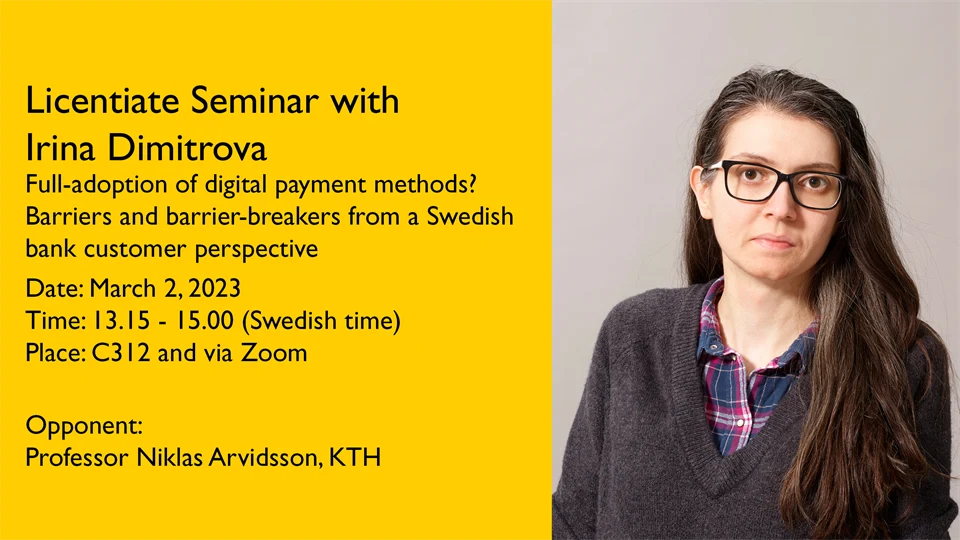Public defence of licentiate thesis with Irina Dimitrova
Welcome to the defense of licentiate thesis in Business Administration with Irina Dimitrova. She will present her thesis: Full-adoption of digital payment methods? Barriers and barrier-breakers from a Swedish bank customer perspective.
To attend, please fill in the form for registration below.
Questions? Please contact Irina Dimitrova.
Application deadline: February 20.
Main supervisor: Professor Peter Öhman. Mid Sweden University, Sweden.
Opponent: Professor Niklas Arvidsson, KTH.
Grading committee:
• Associate professor Marianne M. Rödvei Aagaard, Uppsala University.
• Professor Aron Larsson, Mid Sweden University.
• Professor Heléne Lundberg, Mid Sweden University.
Abstract
Digitalisation and the Covid-19 pandemic have accelerated the decrease in demand for cash worldwide. This also concerns Sweden, which might be on its way to being the first cashless country in the world. The idea of a cashless society is motivated by various assumed benefits, although it also entails certain inherent challenges.
The overall aim of this thesis is to describe and analyse the relationships between barriers and barrier-breakers, respectively, by considering two groups of bank customers, i.e., adopters-accepters and adopters-resisters, and their intentions to fully adopt digital payment methods. A supplementary aim is to investigate moderating effects, because those can affect how barriers and barrier-breakers may increase or decrease the intention to adopt digital payment methods. The thesis includes two papers, one focusing on barriers and the other on barrier-breakers.
An online questionnaire was sent to the two groups of Swedish bank customers, i.e., young bank customers (representing adopters-accepters) and a social media group of cash advocates called Kontantupproret (representing adopters-resisters). The results reveal that adopters-accepters perceived privacy and access barriers to be significantly related to the intention to fully adopt digital payment methods, while adopters-resisters perceived only the impersonalisation barrier as significant.
Moreover, both groups highlighted the credibility barrier-breaker, and the adopters-resisters also perceived usefulness and social influence as barrier-breakers in relation to the intention to fully adopt digital payment methods. Additional tests show that bank customers’ past experience may increase the negative effect of the privacy, access, and impersonalisation barriers on the intention to fully adopt digital payment methods. At the same time, the impersonalisation barrier may decrease the positive effect of the barrier-breakers.
Contact

